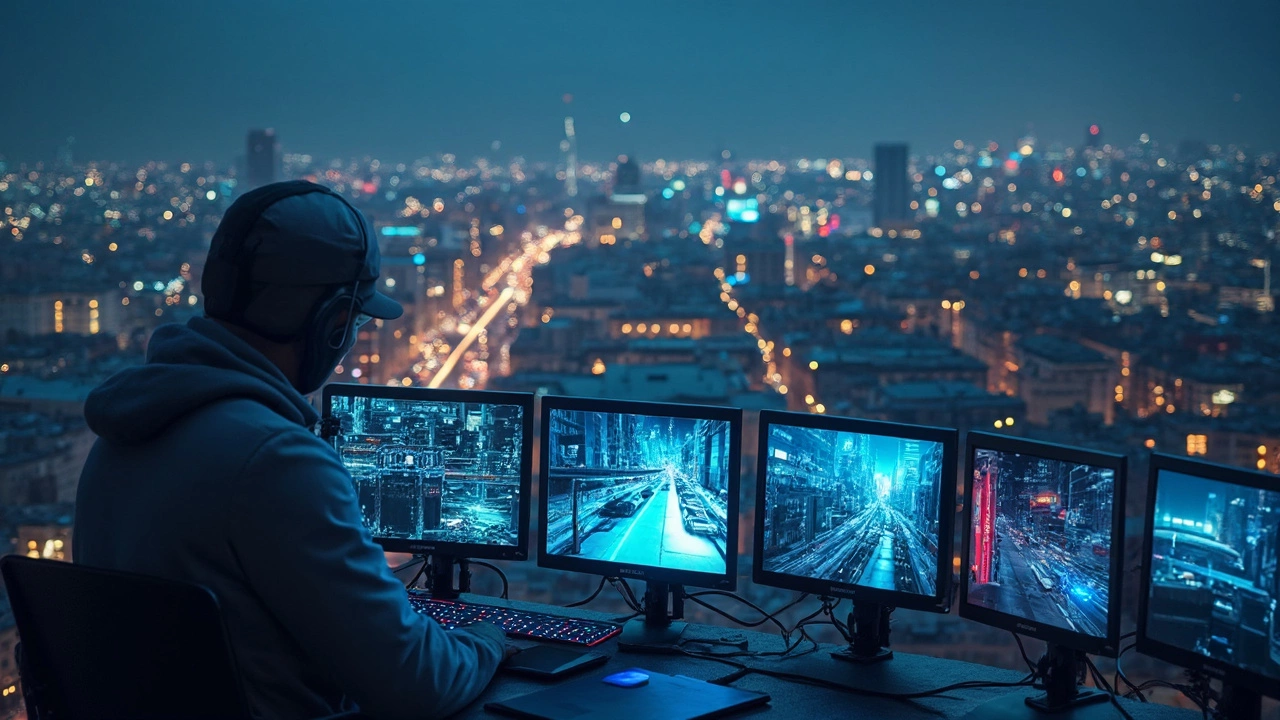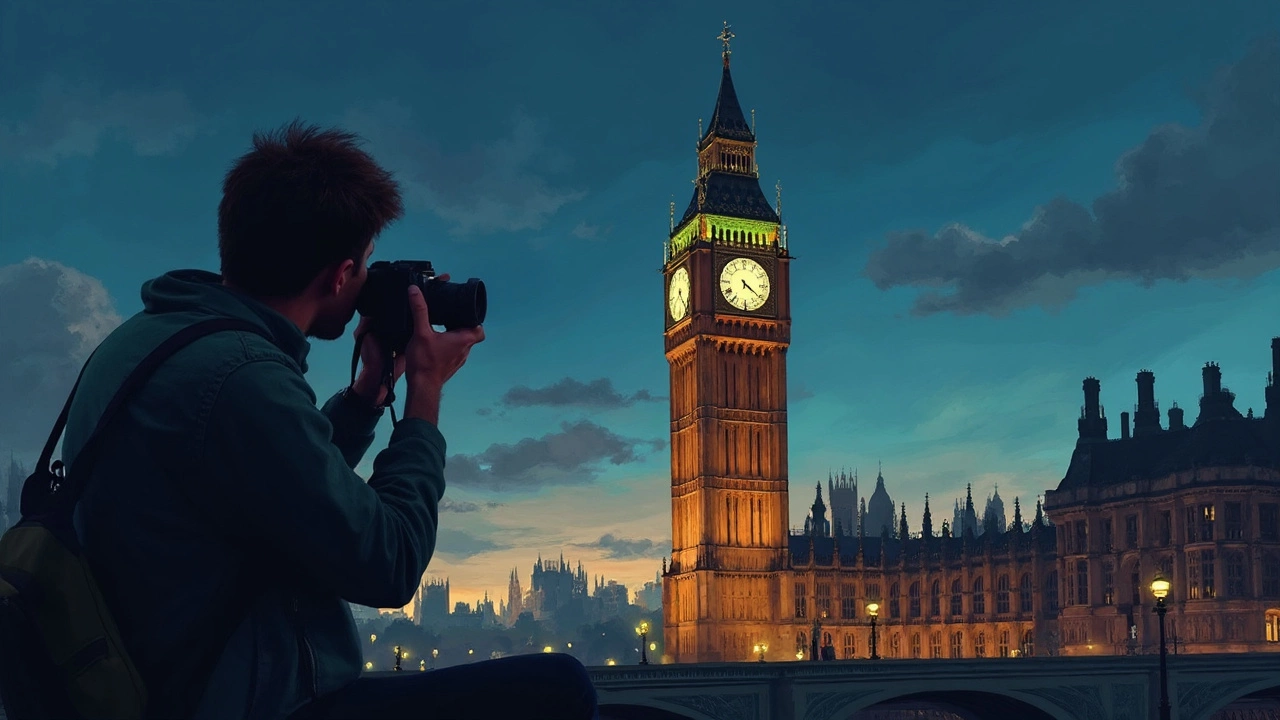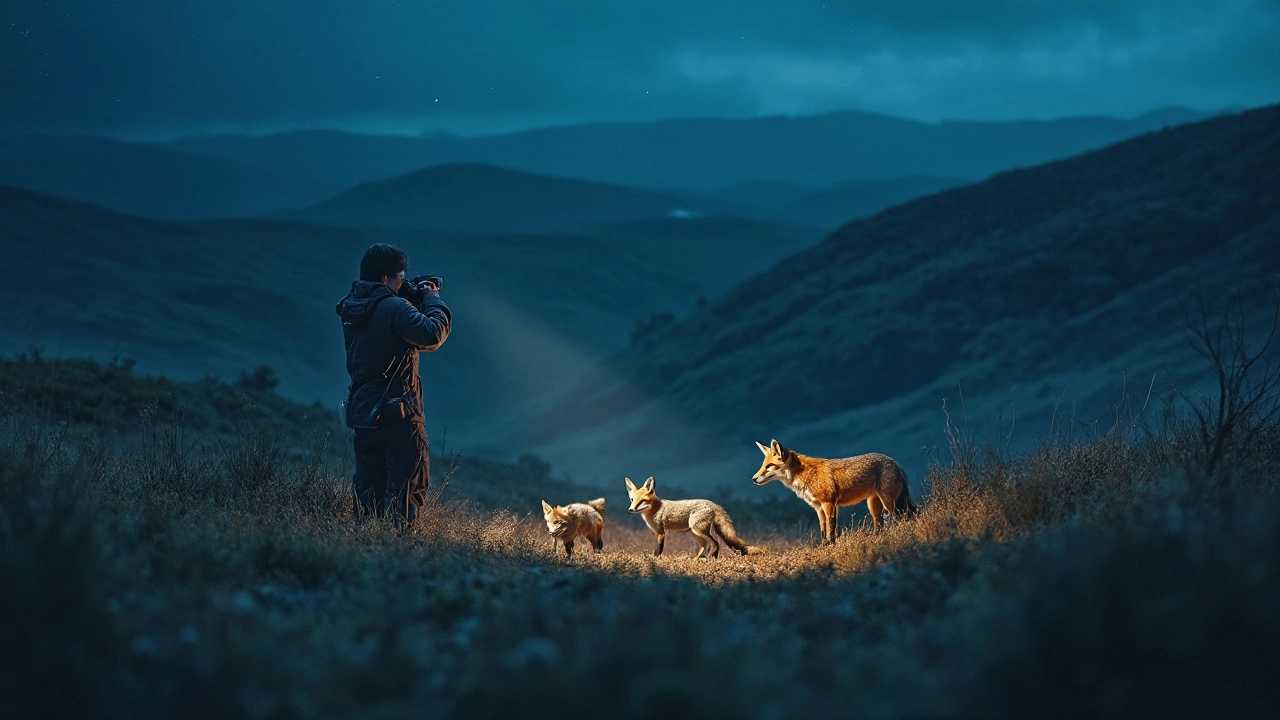Ever tried capturing a moment under the moonlight only to end up with a grainy mess? Welcome to the world of night vision cameras, where basic cellphone cameras just won't cut it. Night vision cameras are game-changers, whether for snapping stunning wildlife pics or boosting home security.
So, what makes for a top-notch night camera? Well, it starts with low-light performance. Some cameras don't just rely on visible light but use infrared technology to enhance images. Professionals often recommend looking for features like image stabilization and resolution, too.
But, before diving into brands and models, it's good to know why you want one. Is it for capturing night sky photography, or do you aim to monitor your garden for nocturnal skunks? Identifying your need isn't just a starting point; it's half the journey.
- Understanding Night Vision
- Top Camera Features
- Brands to Consider
- Real-World Applications
- Buying Tips
Understanding Night Vision
So, what exactly do night vision cameras do? At their core, these cameras are designed to capture images in low-light conditions, sometimes even in complete darkness. They achieve this magic by using either infrared technology or ultra-sensitive image sensors.
How Night Vision Works
Night cameras usually fall into two main types: infrared and low-light cameras. Infrared cameras use invisible infrared light to illuminate a scene. They capture this light reflected off objects and convert it into an image your eyes can see. Meanwhile, low-light cameras use advanced sensors that can operate well in dim conditions without additional lighting.
Key Technologies Used
- Infrared Light: Infrared LEDs emit light not visible to the naked eye but perfectly detectable by the camera, illuminating dark scenes.
- Image Sensors: Sensors like CMOS and CCD in night vision cameras are highly sensitive, allowing them to capture more detail in low-light conditions.
Night Vision in the Real World
You might be surprised, but night vision cameras are used widely beyond photography. They’re essential in TV shows about wildlife, where shots in the dark bring creatures’ nocturnal habits to life. Security firms rely on them for 24/7 monitoring, and they’re also popping up in cars to help drivers see better on dark roads.
Understanding Night Camera Specs
Here's a quick guide to important features to check in a night vision camera:
- Resolution: Higher resolution means clearer images. Look for Full HD or better if image quality matters to you.
- Range: How far your camera can see at night. More range might be better for security than for artistic shots.
- Field of View: The wider the field of view, the more area you'll cover with the camera.
Understanding these features might not just be helpful; it’s a step towards smarter buying decisions. Whether you're keen on snapping nighttime landscapes or busting that sneaky raccoon visiting your backyard, getting to grips with how these cameras work can make a world of difference.
Top Camera Features
Diving into the nitty-gritty of night vision cameras, it's vital to know what features matter the most. While all cameras may seem similar at first glance, the devil is in the details. Let's break it down.
1. Low-Light Performance
This is where the magic happens. The best night cameras have sensors that excel in low-light conditions, making your photos pop even in dim settings. Many top models use tricks like larger apertures or higher ISO settings to grab more light.
2. Infrared Technology
If you're shooting in pitch-black conditions, infrared night vision is your best friend. Cameras with this feature use infrared LEDs to light up the scene, invisible to the naked eye but crystal clear to your camera.
3. Image Stabilization
Wobbly hands are a photographer's nemesis, especially at night. Look for cameras with superb image stabilization technology to keep your shots sharp and in focus, even with long exposure times.
4. Resolution
You want crisp, clear pictures, right? The resolution of a camera dictates how much detail is captured. The higher, the better—but remember, more megapixels need more storage.
5. Ease of Use
If it's a struggle to figure out your camera, you're more likely to miss the shot. User-friendly interfaces, intuitive menus, and customizable settings can make a big difference in your night photography experience.
6. Battery Life
Nothing's worse than a dead battery just when the action starts. Long battery life is essential, especially for outdoor adventures or extended use. Some cameras support swappable batteries, giving you even more flexibility.
Popular Features Comparison
| Feature | Benefit |
|---|---|
| Low-Light Sensors | Enhances quality in dim environments |
| Infrared LEDs | Enables night vision in complete darkness |
| Image Stabilization | Reduces blur from shaky hands |
Knowing what to look for helps you make informed choices. It's all about balancing these features according to your needs and budget. No need to get overwhelmed—start with these basics, and you'll be ready to tackle any low-light challenge.

Brands to Consider
Alright, let's dig into some of the big players in the night vision cameras game. Trust me, knowing who's who can save you from a boatload of confusion and possibly even some cash.
Canon
First up, Canon. This brand is like the reliable friend you always count on. Canon's cameras are known for their excellent low-light performance, thanks to their innovative sensor technology. Their EOS series often gets a thumbs-up for night photography, and the cameras are pretty user-friendly.
Sony
Now, Sony is where you go if you're serious about your night photography. Their Alpha series packs a powerful punch with outstanding image stabilization and mind-blowing sensitivity to low light. People rave about the A7S III, which is almost like having eagle's eyes at night.
Nikon
Can't forget Nikon. They've got the D850 and Z6 II series, which are beasts when it comes to capturing vibrant images in sketchy lighting. Nikon's known for dynamic range and color accuracy, making them a great pick for any photography enthusiast.
Reolink
More into night vision cameras for security? Reolink has you covered. Their cameras are easy to set up and offer great bang for your buck. The Reolink Argus series, for instance, comes with wireless options that make monitoring a breeze.
Here's a quick comparison to sum up:
| Brand | Strength | Popular Model |
|---|---|---|
| Canon | Low-light performance | EOS Series |
| Sony | Image stabilization | Alpha A7S III |
| Nikon | Dynamic range | D850 |
| Reolink | Ease of use | Argus Series |
Each brand has its own flair, so it really depends on what you prioritize. Whether it's stellar image quality or a simple setup for home security, there's a night camera out there with your name on it.
Real-World Applications
Night vision cameras aren't just for spying from spy movies. They're super practical in everyday life, offering handy solutions for various situations.
Security and Surveillance
Let's kick off with something obvious—night vision cameras are a staple in home and business security. When it gets dark, bad guys might think they're invisible, but a good camera reads through the black like it's daylight. These cameras typically use infrared LEDs to light up the night, creating clear images you otherwise couldn't see.
Wildlife Observation
For all you nature lovers, capturing the nightlife in the animal kingdom is endlessly fascinating. Cameras with night vision can snap candid moments in the forest without disturbing wildlife with lights or loud overtones. Plus, you get to see creatures like owls and foxes in all their nocturnal glory!
Night Time Photography
Photographers often lean into low-light cameras when the sun drops. Long exposures can create beautiful artistic frames of cityscapes or star trails in the sky. Some cameras even boast special modes for just this type of shot, making your Instagram feed the envy of all your followers.
Marine Exploration
Divers have a blast using night vision cameras underwater. Since many sea creatures are most active after dark, these cameras are indispensable for seeing what lurks in the depths, offering a whole new view of the underwater world.
Beyond just capturing images, night vision cams have contributed to research, helped in tracking endangered species, and even given us a peek into historical cave paintings that are too deep in caves for natural light. Want to get one? The key is figuring out what you'll use it for first and foremost.

Buying Tips
Picking the right night vision camera can feel like walking through a maze. But don't worry, we'll shed some light on the way to make it simpler.
Set Your Budget
Let's get real—what you spend matters. High-end models with tons of features can cost a pretty penny. But if your night photography needs are basic, you can snag a reliable camera without breaking the bank.
Check the Specs
Pay attention to specs like resolution and sensor type. A larger sensor typically means better low-light performance. Look for at least a 12MP camera for a decent image quality. Also, consider the range of night vision, especially for security cameras.
Consider the Lens Quality
The lens is often overlooked, but it's crucial. A camera with a fast lens (like f/1.8 or faster) can handle low light better, giving you clearer images without too much noise.
Try Before You Buy
If you can, hands-on experience is gold. Test out the cameras if they're on display in stores. You’ll get a genuine feel for them, especially how easy they are to use in the dark.
Comparison Shopping
Online reviews and comparisons can be lifesavers. Websites, forums, and YouTube channels are full of reviews on night vision cameras. Check for reliability and real-world performance. Don’t just trust the marketing mumbo jumbo.
Check for Warranty
Night cameras aren't usually cheap, so a good warranty is a must. Look for options that cover repairs or replacements, at least for a year.
| Feature | Importance |
|---|---|
| Resolution | High – Affects image quality |
| Sensor Type | Essential – Bigger sensor is better for low light |
| Lens Aperture | High – Affects ability to capture light |
| Warranty | Needed – Protects your purchase |
In the end, picking the best night camera depends on understanding your needs and balancing them with what’s available—and hopefully, this guide makes it a whole lot easier!

